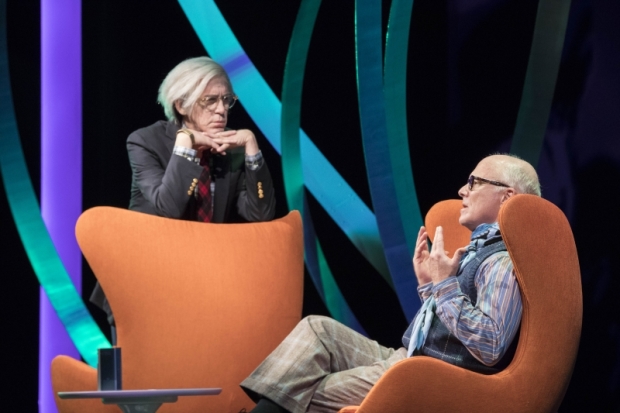WarholCapote

(© Gretjen Helene)
"Every act of art is the act of solving a mystery," says Truman Capote early in WarholCapote, a new play about the friendship of Truman Capote and Andy Warhol. Art ought to have an echo, Capote thought.
There is a sense of mystery inherent to this world-premiere production, now playing at the American Repertory Theater, by virtue of its two subjects, eccentric geniuses who enjoyed great notoriety and success, yet largely remained a mystery to themselves and to the public. Impressively adapted by Rob Roth and sleekly and affectionately directed by Tony winner Michael Mayer, real conversations between the two great minds expose the desolation that often goes hand in hand with fame and fortune.
It was a line in The Andy Warhol Diaries — "Went to Truman’s apartment, got six good tapes for the play" — that inspired Roth. Warhol went everywhere with a tape recorder, recording conversations along the way. Roth waded through the 70 hours of tapes in hopes that a play that could be fashioned from Warhol’s conversations with Capote. But WarholCapote is no mere splice job. Roth has, with thrilling precision, managed to craft something that works on every dramatic level, impressive especially because of what he had to sift through to get to this point. Under Mayer's direction, the play is a taut meditation on art — as well as the toll it takes on the artist — and friendship that manages to be outrageously funny and excruciatingly sad.
According to Warhol, there wasn’t anyone else like Truman Capote; he thought him a "magic person." Truman called Warhol a hopeless born loser and one of the all-time most fabulous people he’s ever known. As was often the case with Warhol, he was a fan first and a friend second. For years he wrote Capote letters, and for years Capote avoided him. But the two finally came together in the end, bonding over the idea that they should write a play.
Stephen Spinella stars as Warhol and Dan Butler as Capote. Both men nail their respective characters' speech patterns and mannerisms and infuse these icons with ineffable humanity and an aching sensitivity. The banter between the two is filled with catty gossip about the usual suspects: Liza, Mick Jagger, Tennessee Williams, and Jackie Kennedy. Warhol loved to gossip, and in that way Capote was very much his match. But Warhol earnestly worshiped celebrities and was rarely critical of them, something that infuriates Capote, who in one memorable scene states: "I am never generous. I’m mean, mean, mean!"
Spinella’s whole body transforms into Andy Warhol. His is a flawlessly introspective performance that colors Warhol not only with the bold strokes of quirkiness and awkwardness that have become the icon's trademarks, but also with a deeply felt meticulousness that takes your breath away. Butler, too, has similar success as Capote, even if he occasionally seems bogged down by the specific demands of the character’s physicality and way of speech.
By play’s end, Capote admits that although Warhol is the one person he doesn’t understand, he’s also the person he cares about more than anyone else. Part of the heartbreak of WarholCapote comes from the way Warhol shuts down when things get too personal, with no concept of how to interact with another person beyond the superficial. But the pair's final scene together is enthrallingly acted. A profound tenderness reverberates long after play’s end.
The lean 85-minute runtime accentuates its power. One of the notions put forth in the play is the idea that meaning evaporates the longer you look at a work of art. To that end, Roth and Mayer have succeeded in taking that sentiment to the heart of the production. The physical scene elements highlight the aesthetic of the time period, with Darrel Maloney’s pop-art-inspired projections and Kevin Adams’s lighting, which add dimension to Clint Ramos’s simple but effective set design, which frames the space in unspooled tape from a cassette.
WarholCapote succeeds as an indispensible glimpse into the hearts of these two men and as a matter of culturally vital historical record. To miss it would be to forfeit one of the most rewarding theatrical experiences of the last several years.










